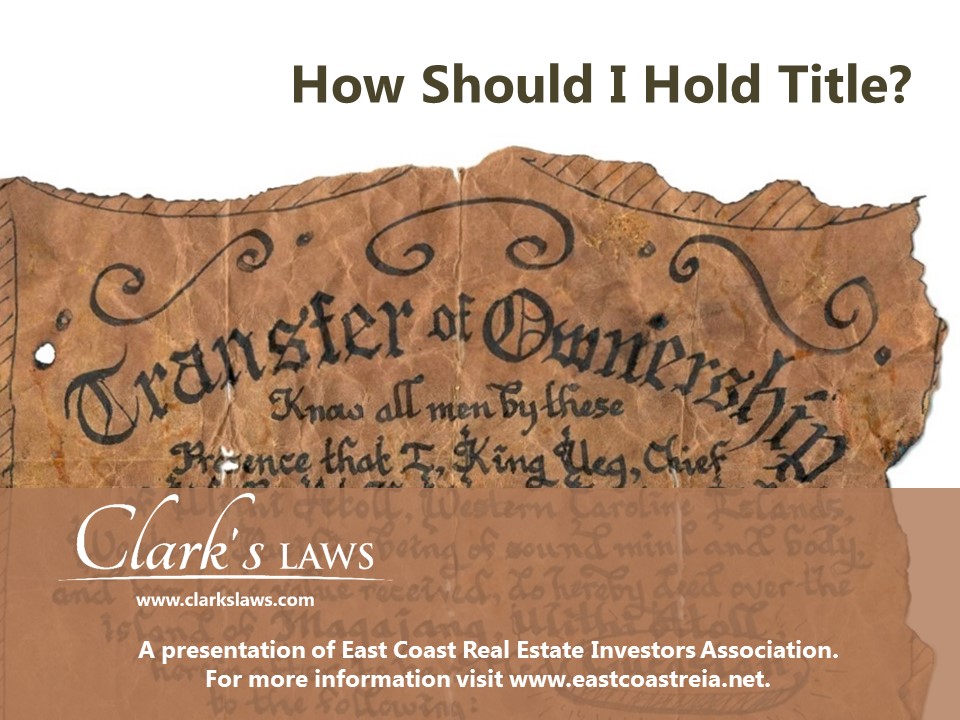
How to Hold Title to a Residential Rental Property
The following is a clip from a presentation that attorney, Jim Clark made to the East Coast Real Estate Investors Association (“ECREIA”) in March, 2019 entitled: “Landlord Advocacy: The Legalities of the Residential Buy & Hold Model on Long Island.”
Mr. Clark will be leading a follow-up discussion on these topics, and specifically how they’ve changed under the New York Housing Stability & Tenant Protection Act of 2019 at the monthly meeting of ECREIA at 6:30pm on September 25, 2017 at Domenico’s Restaurant at 3270-A Hempstead, Tpke, Levittown, NY 11756. To learn more about ECREIA, click here.
In this clip, Mr. Clark discussed the best way to hold title to a residential rental property and the factors that go into the determination.
Video clip transcript below. To view the full presentation, click here.
During this presentation, Mr. Clark discusses solutions to some of the most common legal issues landlords face including:
- How to hold title to a rental property
- How do I know if it’s a good rental property?
- Marketing Strategies For Your Rental Property
- Applications and Tenant Background Checks
- Anti-Discrimination Laws Effecting Long Island Residential Rentals
- What About Lease Agreements
- How About Security Deposits
- Collecting Rent
- What To Do When a Tenant Doesn’t Pay
- The Landlord Mindset
East Coast Real Estate Investors Association is a member group of National REIA and conducts monthly educational and networking meetings for real estate investors. To learn more about ECREIA go to http://www.eastcoastreia.net.
For more information, or if you need help with a landlord-tenant or eviction matter, please contact us.
Full Video Transcript:
The Best Way To Hold Title to a Residential Rental Property
Landlord Advocacy: Legalities of the Residential Buy & Hold Business Model on Long Island.
Number one question I always get, is how should I hold title when I’m preparing to purchase a rental property? Well, basically it’s a four level inquiry.
It all starts with the financing, because without the financing, without the money, there’s nothing else to talk about. But in addition to the financing, you’ve got asset protection, you got the estate and tax planning, and then the fact that you have multiple owners. So number one consideration is financing, because where your money’s coming from will have a big difference on how you hold title. If you go to a conventional lender and you’re looking for the cheapest money, your conventional lender is going to want to loan to an individual. So the question is done, you’re holding it as an individual, period. There are other financing sources around now, a lot of them, that will allow you to hold title with an entity, but they tend to be more expensive. If you’ve got room in your deal, I recommend consider it, because once you hold title with an entity, you’re going to be better off as far as liability protection goes, which that’s the next question.
Asset protection, that’s something you got to be worried about. And many people come to me and they say, “Well, should I put it in entity? Because I’m worried about if somebody slips and falls on the property.” Usually that’s not a consideration because you have insurance for that. More than that, if that’s your only thought of why you want to put it in an LLC, then that’s probably not enough. But on the other hand, there’s other liability that can come from other places that you do want to be concerned about.
I had a client just a couple of years ago, had many rental properties, residential rentals, owned them all in his personal name. He had an issue in that his car insurance lapsed, and he happened to get into an accident when it lapsed, and it was a bad accident and he killed the guy that he hit with the car, and they came after him and since he had no insurance at the time, all of his assets were subject to liability.
So now all of his rental properties that he owned in his personal name were fair game, and he had to sell some of them in order to make this go away. Now if he held title to these properties in LLCs, they may still be able to get to them as well, in that situation, but it’s a lot more difficult, there’s an extra layer of protection that would’ve helped them there.
Another issue is estate and tax planning. So, when you’re planning for your estate, basically you’re planning on passing your property onto the next generation. Rental properties become a big issue, because if you’re doing it right, you’re going to want to hold this rental property for a long time. And many people hold it and they want to hold it for generations and they want to pass it on to their kids. So if you hold title individually, it’ll just pass by virtue of your Will, fair enough. But if you have a lot of them and you have other estate issues, then you might want to consider holding it through a LLC. Some people say, “Well, how about a corporation that’s a better liability protection?” Well, actually it’s the same liability protection. But the problem with a corporation is if you hold it with an S corporation, the only people that can own that S corporation are individuals. Whereas if we hold it an LLC, the owners can be things like trust and then you can shift around the ownership a lot easier.
I had an older client not too long ago, he actually passed away. He had 20 something rental properties and he owned him in an LLC. And the LLC was owned by a trust. And this guy had six kids from two separate marriages, and they hated each other and they would all try to get on his favor one way or the other, because they wanted his property. And he came to me, probably like three or four times changing things around. The deed never changed, but the underlying ownership and who was getting it changed. So you can do things like that when you use an entity.
Multiple owner planning, let’s just say you buy a rental property with more than one person and you guys both go on individually. Well, in order to do anything with that property, you need two signatures. One from each owner. That’s just deeds. If you put it in any other entity, then you might not. I had two brothers that owned the rental property together. They were the best of friends. . . You know where this is going? They were both contractors worked in the same business. Great rental property investment. They planned on keeping it forever. They had a falling out. They don’t talk to each other anymore. The one brother took over management of the property, he wants to get rid of it. The other brother says, “No, not unless you pay me, pay me a lot.” And so they sit there, for years now just thinking about how they’re going to get out of the situation. Because neither one of them wants to start a partition action, because that’s expensive and they got a mortgage and by the time they’re done, there’s not going to anything left?
So these are the things that I think about when somebody asks me, “How should I hold title?” My recommendation is hold title with an LLC, unless the financial constraints dictate otherwise. If you’re buying a property because of cheap financing, then you have no choice. But otherwise use an LLC. The other question I get is, should I put it in separate LLCs or one LLC? For liability purposes, it’s better to have a separate LLC for each property, but for management purposes and for other reasons, you might want to consider putting all your rental properties into one.
I have one client who is executing a strategy of buying as many single family rentals as you can. He’s putting them all in the same LLC. When he’s done, he’s going to sell it off as a portfolio, do a Section 1031 exchange into a commercial property. With that strategy, it’s better to hold it in one LLC.

